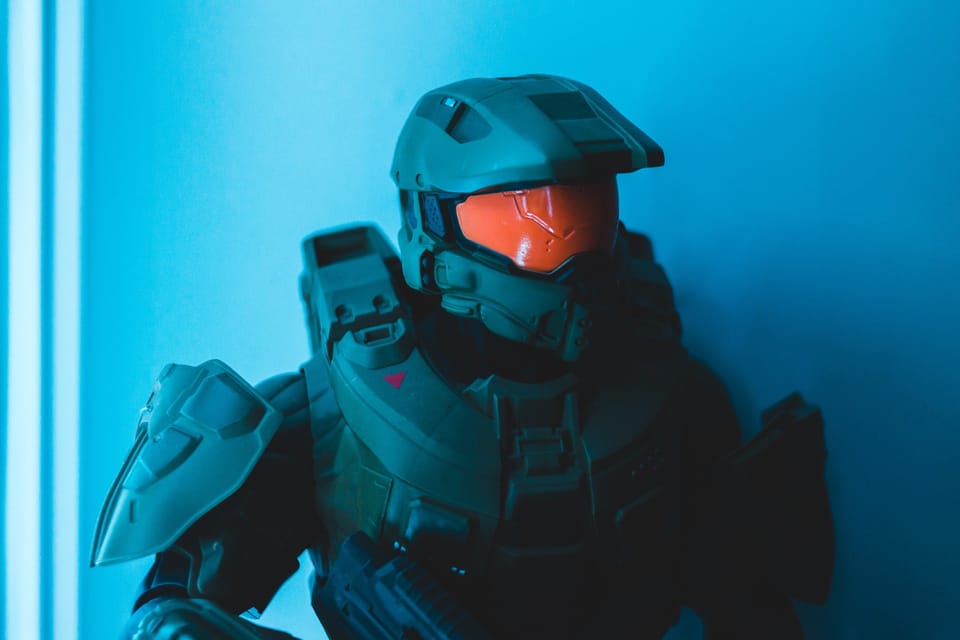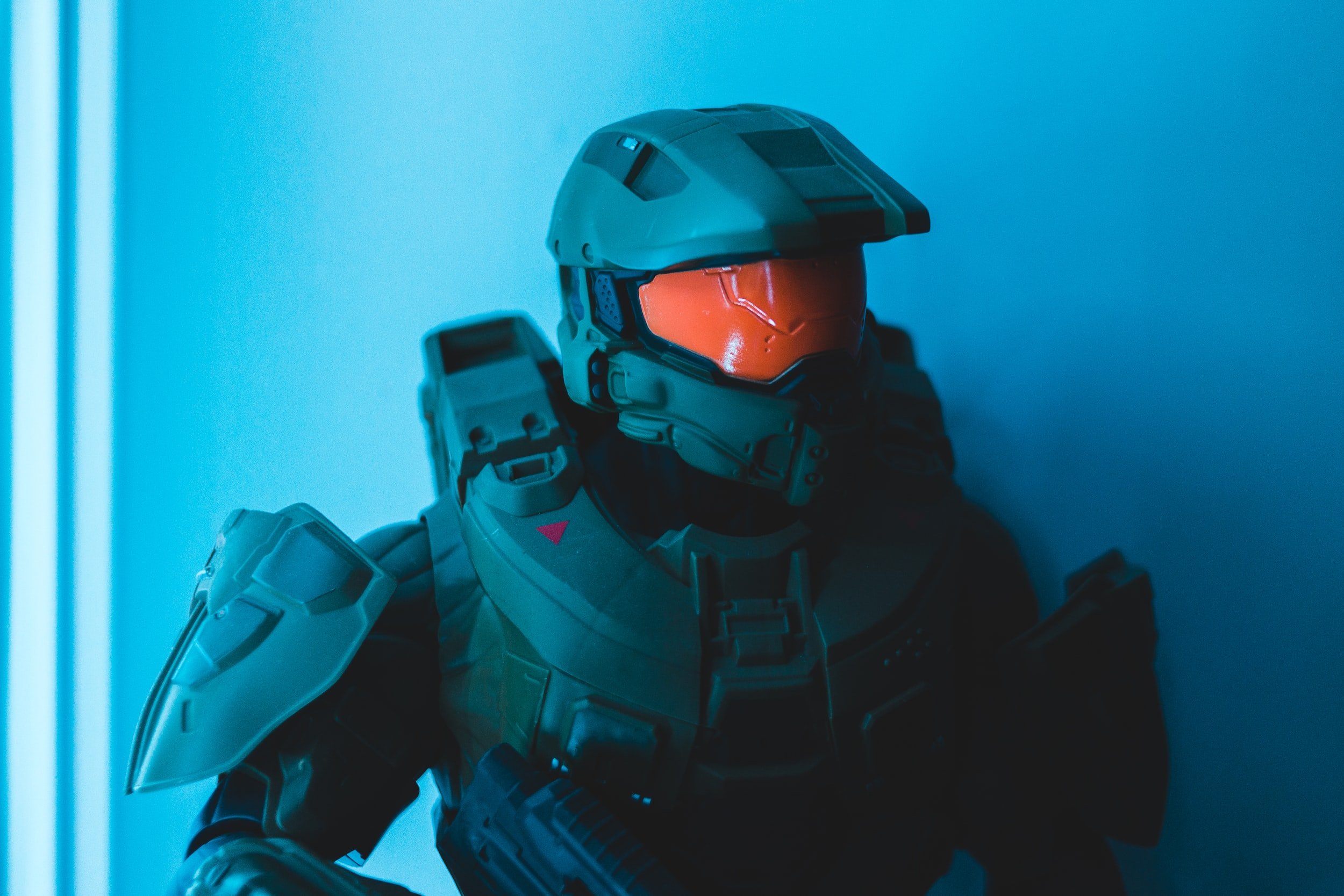Sexualizing Master Chief: Erasing a Hero's Asexual Identity


Source: Unsplash.com - Erik Mclean @introspectivedsgn
Reading the headline “Master Chief has sex in Halo episode 8…” should not have reduced a grown, middle-aged adult to tears. The course change of the lead fictional hero in a video game franchise launched during my young adult years, should not have had any impact on me. Except that it did, and still does, all these months later.
Frustration, betrayal, a bit of rage, all seemed over reactive. What bonkers headspace was I in that the news of Master Chief having sex would spur such an emotional response. I knew the wildly successful games, and books so good that I’ve read and re-read the first four several times, had a blind writer treatment for the then new show on Paramount+, and I knew the diehard fans were up in arms over the decision to turn said writers loose to come up with new material, but I was not prepared for this particular outcome. By sexualizing Master Chief, the writers erased one of the few positively-viewed asexual heroes from mainstream media.
The first announcement of the new Halo show coming to Paramount+ was all I needed to hear: This is going to be good, I thought. I believed it so much that I swore off all media related to Halo until the show’s premier earlier this year on March 24, 2022. Ever the optimist, I went in fully rooting for a wonderful telling of a story I’d been following for years. I don’t have time for games these days, so I stick to reading and watching related content. Even this has tapered off in favor of more pressing content with bigger world impacts, but my love for Halo meant I could justify the hour per week required to watch the new show.
Immediately after watching episode 1 Contact, I DM’d my friend: Am I losing it, where’s Kelly? Him: Nope. They wrote her out of existence.
The show writers had yanked such an important character from the script, and gone ahead with completely reworking what had made the original story amazing. It was then that I learned the writers knew nothing at all about Halo: they had had no exposure to the games, books, not even fan fiction. The heart and soul of the Halo series, Blue Team, had been recast and recharacterized. With this blunder, the identities of the Halo Spartans, as defined by the video games and books including their asexuality, was dismissed.
Asexuality is not a “condition” in need of treatment or fixing. The asexual Halo Spartans could be viewed as having had this sexuality selected for them, but none of the other fundamental changes they endured to metamorphasize are scrutinized beyond a matter-of-factness of necessity. The fans immersed in Halo accept how the physical and psychological facets of a human being had to be genetically and cybernetically augmented in the cadets when they were young children so that the very few who survived the ordeal would grow up to become Halo Spartans: The first, last, and only significant defense of future Earth systems. Players and readers alike are drawn to and connect with the Halo Spartans as they are defined by the canon: their identities as super elite soldiers exempt from the frivolity and distraction civilians face. The Halo Spartans are asexual persons who understand connection, camaraderie, love, and intimacy at a level so much deeper than the fickle and fleeting layers of sexual attraction because their survival, and that of every human in the galaxy, depend on it.
A few years ago at 41 years of age, my then 17-year-old looked me dead in the eye and said, “Mom, you’re ace.” After figuring out what the heck ace was, fumbling my way through social media, blogs, finding communities on Reddit and locally, and reading two insightful books on the topic, I had to agree. Oh hey, I’m asexual.
Growing up, I saw my friends lose interest in pets and bikes, shifting to members of the opposite sex overnight. I still wanted to watch adventure movies and play games, but my friends transformed and I couldn’t figure out why. In later stage adolescence I finally understood the changes of course–thanks sex ed and MTV–and while I still wasn’t drawn to anyone the way my peers all seemed to be, inexplicably fawning after every other teen music or television idol, I did feel the longing for connection, for that deep sense of belonging to someone who cared about me. But what I felt was not the same as the sexual attraction my peers were experiencing. Trapped with a dearth of information had left me mistakenly equating my need for connection to what the sexual world around me said I should be feeling.
All through my teens and up until I was pregnant with my first child, I had experienced one let down after another. I’d “voluntarily” submit to sex but I didn’t like it, so I’d break off the relationship, citing a personality mismatch. I maintained some semblance of a long term relationship in order to ensure the wellbeing of my children, but sex still sucked. I’d have to get blitzed out of my mind to engage in the act and to get off.* I was 41, newly divorced, and only then did I learn that asexuality was a legitimate sexual identity. Only then did I learn that I needn’t have gone through what I had.
Most people have no idea what it means to be an asexual person. Ridiculed and dismissed, a sexual identity foisted upon the disabled even though most do experience sexual attraction. Viewed as a challenge by rapists who are convinced you’ve just never had it done right as they try to fix you through forced or coerced sex. Rigid, uptight, gay, sexually abused or sexually repressed, a litany of reasoning is lobbed at asexual people, but the one straightforward answer, that a person who does not experience sexual attraction to anyone (hetero, homo, bi, pan, or otherwise), is simply an asexual person. Only until people see asexual representation in our every day lives, and accept it as it is, will this kind of abuse, dismissal, and discrimination stop. Even amongst the LGTQIA+ community, asexual people are met with derision.
Pro Tip: the A in LGTBQIA+ does not stand for ally, it’s for a-spec identities covering the asexual and aromantic spectrum.
Master Chief, and his squad of Spartans, are a beautiful example of asexual heroes. The team is complex, full of personality and love, commitment to each other and to the whole of humanity. Their asexual selves represents much of what we everyday asexual people are seeking in our lives. To see such a powerful presence, an important figurehead in our entertainment whose asexualness is written out of the story, feels like erasure. And for an identity that is barely recognized in the first place? This one hurts.
If we can see it, we can be it. The mantra is oft repeated but television and movie producers are relentless in their refusal to adopt change, especially when it comes to sex because it sells. But sex isn’t the only thing that sells, and with younger generations focusing less on sex and more on connection and life experiences, those in charge of telling stories must take heed.
Seeing characters like Master Chief in his original asexual portrayal teaches people that we do not have to compromise ourselves in order to experience love, commitment, loyalty, and intimacy. The knowledge that someone cherishes you above all else, that they would give their life for you, does not require setting aside your comfort to please them. A young man does not need to prepare himself for a life of sexual prowess that he does not feel in order to prove the depth of his love. A young woman does not have to ready herself to “do her duties” to ensure she will have someone by her side to love her. None of us needs to operate under the assumption that to have deep, meaningful connections with others, we have to forfeit our boundaries. In order for this message to reach the masses and shift the cultural norms, we need to see asexual representation in heroes like Master Chief as he was originally defined.
*Asexuality is complex and includes a spectrum ranging from sex repulsed to sex positive. Some people have a strong sex drive, others do not have one at all, but in either case, a libido is not the same as sexual attraction. Asexuality is simply the lack of sexual attraction to others. For more information on asexuality, please read the Overview and Family/Friends FAQ on AVEN (The Asexual Visibility & Education Network).



